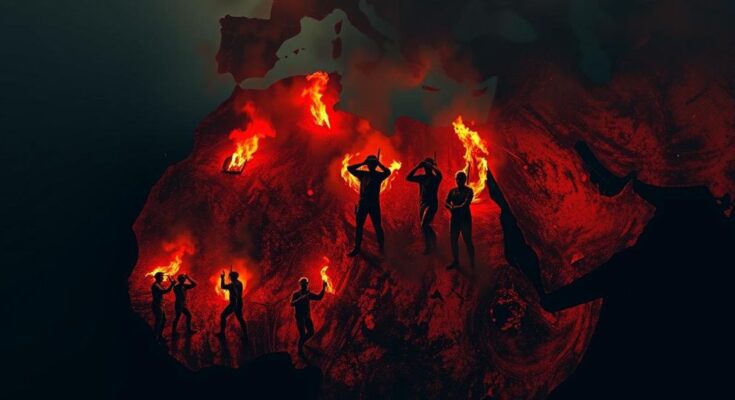Military juntas in Mali, Burkina Faso, and Niger are facing growing discontent among the populace due to unmet promises and harsh tactics employed by Russian mercenaries. Investigative reports reveal increasing civilian and military casualties, a crackdown on dissent, and continued economic struggles despite anti-colonial rhetoric against France. The formation of the Alliance of Sahel States marks a significant regional pivot but raises concerns about governance and human rights violations, fueled by deep-seated resentments and misinformation.
Rising discontent regarding military juntas in the Sahel region is being observed as the populace expresses dissatisfaction following the initial support for the coups in Mali, Burkina Faso, and Niger. The juntas asserted that civilian governments were complicit with France, the former colonial power, in exploiting local resources, prompting civilians to rally under Russian flags while burning those of France. However, recent investigative findings indicate that confidence in these military regimes is waning, primarily due to their unmet promises and the harsh treatments inflicted by Russian mercenaries upon residents. Evelyn Groenink, the coordinator of ZAM, highlighted that graffiti declaring ‘Russia out’ has emerged in Niger, signaling a critical shift in public sentiment. ZAM’s investigation, titled “Hotel Kremlin,” involved undercover reporting by three African journalists in the aforementioned countries, exposing the grim realities under military rule. Life for the citizens has been increasingly bleak, as evidenced by Malick Sadibou Coulibaly’s report on severe power outages in Mali. The initial hopeful sentiment following the coups, which aimed to replace Western influence with Russian support, has deteriorated as both civilian and military casualties have escalated, contrary to earlier assertions. In seeking to counteract sanctions imposed by the Economic Community of West African States (ECOWAS), the juntas have formed the Alliance of Sahel States, a mutual defense and trade pact that signifies a shift away from ECOWAS towards closer ties with Russia. Despite the intentions behind this agreement, there remains a visible lack of economic improvement for citizens across the region, led by noticeable developments benefiting junta members. Furthermore, there has been a notable crackdown on dissent, with opposition figures, journalists, and activists facing significant repression. Reports of abductions and enforced disappearances in Burkina Faso, media bans in Mali, and similar trends in Niger reveal an alarming pattern of authoritarian control in the region, drawing concern from human rights organizations and the international community. Underlying the situation is a deep-rooted resentment towards France, exacerbated by the perception of inadequate support in countering terrorism, which Russia has exploited through misinformation campaigns. Observations suggest that rather than restoring stability, Russian paramilitary forces have contributed to a heightened climate of fear and violence within the Sahel, undermining the safety of the very populations they claimed to protect.
The Sahel region has been under significant political strain due to military coups that resulted in the displacement of civilian governments in Mali, Burkina Faso, and Niger between 2021 and 2023. Allegations of corruption and collusion with colonial influences were weaponized by the juntas to justify their takeover. As discontent grows, the supposed benefits of Russian intervention, particularly by the Wagner Group (now the Africa Corps), have fallen flat against a backdrop of increasing violence and mismanagement. The formation of the Alliance of Sahel States seeks to realign regional power dynamics away from former colonial ties, but the human cost appears to be escalating, thus raising substantial eyebrows both regionally and internationally regarding governance and human rights.
In summary, the discontent with military juntas across the Sahel region reveals a complex landscape of disillusionment and repression. As initial support falters due to unmet promises and escalating violence, the populace is increasingly vocal about their dissatisfaction. The anti-colonial sentiment driving the juntas appears at odds with the realities of governance, where failure to deliver on economic improvements and basic services continues to plague citizens. Furthermore, rising authoritarian practices across these nations indicate an urgent need for dialogue and potential reforms to restore faith in leadership while ensuring respect for human rights.
Original Source: www.dw.com




